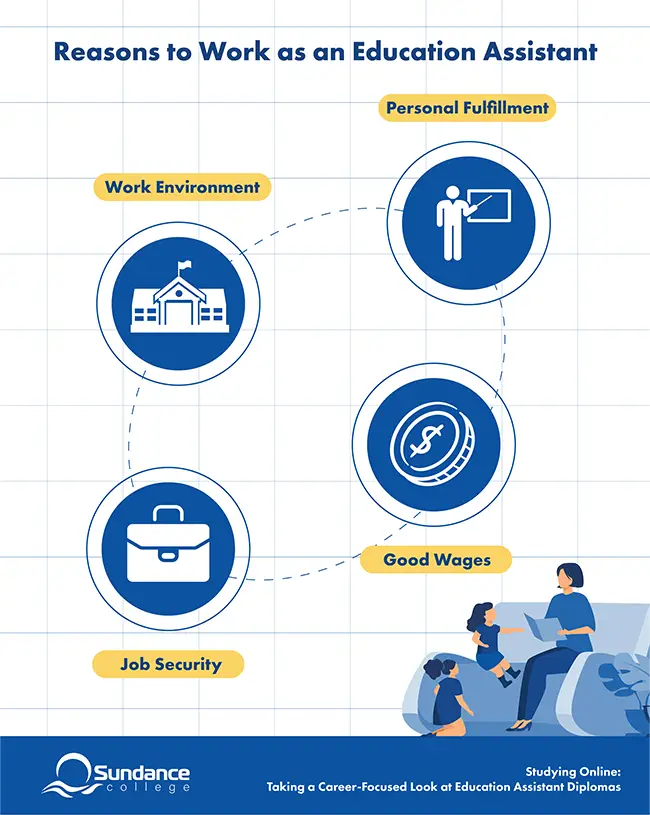Blog / Taking A Career-Focused Look at Education Assistant Diplomas
Taking A Career-Focused Look at Education Assistant Diplomas

Education Assistant Diploma
- Education Assistant
- Educational Resources Assistant
- Homework Assistant
- Remedial Education Aide
Table of Contents
Have you ever considered a career that not only allows you to make a meaningful impact on the lives of young people, but also serves as a fast track into the world of education? If you’re someone who thrives by nurturing young minds and is passionate about working with youth, a career as an education assistant could be the role you need to feel fulfilled.
Education assistants are support members of the educational team. They assist teachers with student learning and can be found in a variety of school settings, from elementary all the way to high school and post-secondary education.
We are going to take a career-focused look at the role of an education assistant, and what it takes to become one. We will provide insights into the reasons to become an education assistant, the essential skills needed for success, and how Sundance College’s Education Assistant diploma program can prepare you for this career in less than a year.
Why Should You Choose a Career as an Education Assistant?

When looking to find a meaningful career in education, becoming an education assistant (also called teacher’s assistant, teacher’s aide, or classroom aide) is faster and equally as impactful as attaining a teaching degree.
Here are some more reasons to choose this route:
Job Security And High Demand
Job security for student support specialist opportunities, like education assistants, is tied to the demand for the role. For example, in Alberta, the promising job outlook for education assistants is a result of key factors including an upswing in government funding and an increase in enrollment rates.
Personal Fulfillment Through Working With Youth
In an education assistant role, direct interaction with children goes beyond traditional education. These teaching support specialist roles provide personalized support and one-on-one engagement and facilitate group activities with students. They create meaningful connections and foster an environment that meets the unique needs of each child. This engagement, centered on trust and encouragement, contributes significantly to the development of the students.
Diverse Job Opportunities
Education assistants play an important role across diverse educational landscapes, including public and private schools, preschools, elementary and secondary institutions, and even post-secondary settings. The impact of their teaching assistant duties extends to specialized programs or facilities for students with disabilities or behavioral challenges.
Competitive Salaries
Education assistants enjoy attractive compensation. Based on positions posted on Indeed, an average of low and high salaries examples include:
- Alberta has an average salary of $41,366.
- Manitoba has an average salary of $49,712.
As professionals accumulate experience and consistently demonstrate high performance, compensation may adjust in line with that experience and competency.
The Role and Responsibilities of Education Assistants

Education assistants play a vital role in fostering a supportive learning environment by performing their teacher aide duties and obligations. Their educational assistant tasks include supervising students within the classroom and in the schoolyard, as well as during various out-of-school activities.
An education assistant’s classroom aide functions and responsibilities include the preparation of classroom materials and supplies, including the creation of engaging bulletin boards that help to keep students engaged and in an aesthetically pleasing environment. To create eye-catching, interactive, and engaging displays, an education assistant often handles the operation of educational tools, from copy machines to computers and projectors.
Ensuring students are physically safe while in their care is an important part of the education assistant role. Addressing the physical well-being of students can include performing first aid procedures, managing medical supplies, administering medications, and promptly seeking additional assistance when necessary.
Additionally, they actively support students in their learning journey by assisting with activities assigned by the classroom teacher or leader, aiding in the development of essential social skills and life skills. They also aid teachers with their marking, reporting, and other administrative duties.
An education assistant also has some special responsibilities that they take on in particular circumstances:
Educational Assistant Duties With Younger Students
When working with very young students who require extra attention and support in daily activities, educational assistants provide supervision and assistance to the students and ensure seamless transitions during arrival and departure times, along with attentive care to clothing needs throughout the day.
Educational assistants also help young students with their daily needs like feeding, lifting, positioning, and addressing toileting and diapering requirements for those who require it, emphasizing their dedication to the overall well-being, development, and comfort of the students.
Recognizing the importance of a safe environment, educational assistants undertake childproofing measures, ensuring that materials are safeguarded and stored in appropriate places to create a secure space meant to aid the development and growth of the children under their care.
Educational Assistant Duties With Inclusion Support
Collaborating closely with physiotherapists, as well as language and speech pathologists, education assistants help with movement and speech therapy sessions when working with students with disabilities who may require specialized care.
Education assistants also play a vital role in supporting students with learning difficulties or differences. This involves a dedication to following the guidance and direction of specialized therapists, ensuring that students receive the tailored support necessary for their unique needs such as crafting individualized education plans (IEPs).
In addition to therapeutic assistance, education assistants take on the responsibility of preparing, organizing, and maintaining activity centers and therapy equipment. Their meticulous attention to these aspects creates an environment for effective therapy sessions.
What Skills Do You Need to Become an Education Assistant?

An education assistant draws on their curated skillset to succeed in their role. When they combine the following skills with their student support expertise, they help to foster the perfect learning environment for students.
Communication and Understanding – Communication skills in education are vital for regular interactions with teachers, parents, and students. Education assistants need to possess good speaking, active listening, reading comprehension, and writing skills. Understanding and perceptiveness becomes especially necessary when supporting students with disabilities or learning differences, allowing education assistants to interpret non-standard communication and provide tailored support.
Time Management and Organization – Education assistants play a key part in supporting students’ understanding of lessons. This means they must possess strong organizational and time management skills. A key responsibility involves tailoring lesson materials to accommodate diverse learning styles, collaborating closely with teachers to plan engaging lessons. Being able to prioritize tasks and manage resources is essential to ensuring an efficient and effective learning process
Critical Thinking and Active Learning – Active learning, coupled with critical thinking, allows education assistants to understand student behaviors and adjust their teaching methods accordingly. These behavior management skills become significant when problem-solving in education requires alternative solutions to cater to the specific needs of individual students. In their role, education assistants demonstrate multitasking in educational settings, combining effective communication, classroom management abilities, and intellectual flexibility to create a supportive and enriching educational experience.
How to Become an Education Assistant
To become an education assistant, you will want to enroll in a diploma program that provides you with essential knowledge and skills specific to this role. Coursework typically covers topics such as child development, educational strategies, and supporting students with diverse learning needs.
Your diploma program should include a practicum which provides practical experience in real-world settings. This will make you stand out as an education assistant candidate during your job search.
The Value of Practicum Experience for Education Assistants
A practicum offers hands-on experience in an educational setting. This means that students graduate with work experience in their field that they can add to their resumes. This experience is an asset, valued by prospective employers.
When looking into practicum opportunities, look for a practicum length of at least 10 weeks, so that you have ample time to apply and showcase your acquired skills and techniques from your diploma program. It also provides a good length of time to pick up tips and real-world knowledge of the profession.
Recognizing the significance of real-world experience, Sundance College offers a program that integrates courses and a 10-week practicum training, to ensure students are job-ready for their teaching assistant career pathways in less than a year.
Enroll in Sundance College’s Education Assistant Diploma Program
Sundance College’s Education Assistant diploma program could be the path to your dream job that you’ve been waiting for.
This program offers a comprehensive curriculum and hands-on experience through a 10-week practicum to build up your skills and knowledge base while providing you with experience in real-world educational settings.
The program encompasses essential courses such as ‘Introduction to Child Development,’ a cornerstone course that delves into early, middle, and adolescent development, providing educators with an understanding of cognitive, physical, emotional, social, and language milestones.
Whether you prefer in-class or online delivery, our industry-experienced instructors are committed to knowing students, understanding their learning style, and creating an environment for personalized learning.
Take the next step in shaping a brighter future for students and yourself —connect with an academic advisor to learn the possibilities for you within the program. Your journey towards making a lasting impact on education begins here at Sundance College.
Related Blogs
Subscribe for more career advice
Blog Categories
Share on:
